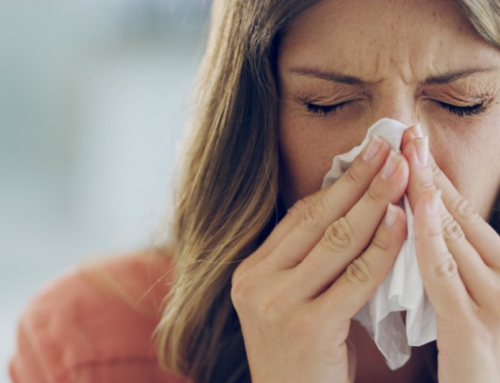CNNTÜRK – April 14, 2021
Eczema is a very common skin condition that affects many people. Eczema, especially seen in children and exacerbated in some periods, negatively affects the quality of life. President of the Allergy and Asthma Society Prof. Dr. Ahmet Akçay explained the details about eczema by stating that severe eczema seen in children can flare up during the pollen season.
What is Eczema?
Eczema, also known as atopic dermatitis, is a skin condition that affects people of all ages. Atopic eczema is the most common form of eczema and tends to run in families. “Atopic” is a term used to describe the tendency to develop eczema, asthma, and hay fever. Some people may have only atopic eczema, but others may also have asthma or hay fever. The main feature of atopic eczema is itching, which at times becomes almost unbearable, leading to sleep loss and restlessness.
What Causes Eczema?
Eczema is caused by a combination of environmental and genetic factors. Dry skin in atopic eczema is caused by a genetically defective skin barrier. In people with eczema, the skin may not retain water. Also, some everyday substances, like soap and detergent, dry out the skin. Since it is not sufficiently filled with water, spaces are opened between skin cells. This means that the skin barrier is not as effective as it should be and bacteria or irritants can more easily pass through. These trigger an inflammatory response that then causes redness in eczema flare-ups. Although the exact cause of eczema is not known, it has been determined that an excessive immune response causes this condition. In some children, food allergies may play a role in causing eczema.
Eczema Symptoms
The symptoms of eczema can vary greatly from person to person. In some children, eczema can be very severe and difficult to treat. The typical symptoms of eczema can be listed as follows:
Dry skin,
Itching, which can be severe, especially at night
Red to brownish-gray spots on the face and scalp, especially on the hands, feet, ankles, wrists, neck, upper chest, eyelids, elbow and knee folds, and in infants,
small, raised protrusions,
thickened, cracked, scaly skin,
Skin that is tender and swollen from itching.
Eczema generally begins before the age of 5 and can continue into adolescence and adulthood. For some people it flares up periodically and then subsides for a while, even over the course of a few years.
Pollens Can Cause Eczema To Flare
A significant number of children with eczema may experience an eczema flare-up during the pollen season. Particularly, some of the children with difficult-to-treat eczema may experience exacerbation of eczema due to the pollen season. Sensitivity to one or more pollen and spring allergies are also common in children in this group. Also, dark-skinned children experience flare-ups more frequently during the pollen season than fair-skinned children. Sensitivity to one or more types of pollen is more common in dark-skinned types than in light-skinned types. Children with eczema flare-ups during the pollen season generally have hay fever and dark skin.
The Importance Of The Season In Patients With Atopic Eczema
In general, eczema symptoms are worse in the winter due to potential dehydration of the skin due to exposure to low ambient humidity (for example, cold air and central heating). However, some patients experience disease flares during the spring and summer months.
It is known that children with atopic eczema experience seasonal changes in disease severity; Winter months are the seasons when the severity of eczema usually increases. There is a lack of information about children with eczema, in which the severity of eczema increases in the spring and summer. One third of patients with difficult-to-treat eczema experience exacerbation of eczema during the pollen season and summer months. According to the results of a study, it has been revealed that eczema flare-ups are more common in the pollen season, especially in children with dark skin type.
Is Eczema Contagious?
Eczema is not contagious, it cannot be transmitted from one person to another. However, eczema can be inherited and passed on from your parents to you through genes.
Allergic Flu, Asthma and Eczema Link
There is a link between allergic rhinitis and asthma, and atopic dermatitis. If a parent has allergic rhinitis or asthma, their child is more likely to have skin problems. However, many children with atopic dermatitis are more likely to develop hay fever or asthma.
How Is Eczema Treated?
Eczema symptoms are different for everyone. In most types of eczema, it is necessary to know the trigger for the treatment of its symptoms. Here are some things you can do to treat eczema symptoms:
Try to avoid triggers that aggravate the situation. Things that can worsen a skin reaction include sweat, stress, obesity, soaps, detergents, dust and pollen. Reduce your exposure to your triggers.
– Follow a regular hydration routine.
– If your doctor has given you medicine, use it in accordance with the instructions.
-Watch out for signs of skin infection.
-Treat the affected area sensitively, do not rub or scratch. Avoid irritating fabrics, such as wool, that can make your eczema worse by choosing soft, breathable clothing.
-Take shorter baths or showers and use lukewarm water instead of hot water. After bathing, gently pat dry your skin with a soft towel and apply moisturizer while your skin is still damp.
-Use only mild soaps. Choose mild soaps. Antibacterial soaps can remove more natural oils and dry out your skin.






